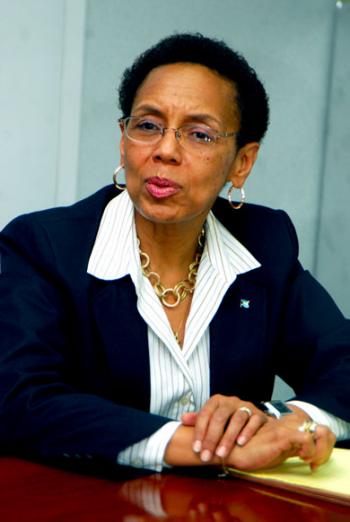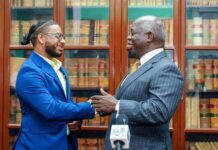
Hon. Allyson Maynard-Gibson, Attorney-General and Minister of Legal Affairs Of the Commonwealth of The Bahamas at the 2013 International Third World Leaders Association. Title: “CHARACTER – The moral force of leadership”, delivered on Monday, 11th November, 2013:
Hon. Obie Wilchcombe; Hon. Michael Darville; Dr. Myles Munroe, Chairman of the International Third World Leaders Association; Mrs. Munroe; Distinguished Members of the Executive Council; Dignitaries and Special Invited Guests; Ladies and Gentlemen…
May I join with the other speakers on the platform in welcoming our special guests and dignitaries from all over the world to Freeport, the northern city of the greatest archipelago in the world—and a country I like to think of as the Israel of the Americas—for this 2013 Global Leadership Summit under the theme, “Character – The Moral Force of Leadership”?
I would like also to congratulate Dr. Myles Munroe for his vision and leadership in forming this alliance of civil and religious world leaders to promote the tenets of principled leadership and morality in all aspects of life, religious and secular, throughout this region and the world.
It can only be by divine inspiration that the genesis of this idea for a global conglomerate of leaders came from this constellation of shallow seas, islands and cays, which have dedicated themselves in their founding constitutional documents to Christian and spiritual values.
I am deeply honoured to have been asked to address this august body of international leaders gathered here for this special summit focussing on character, morality and ethics in leadership.
When asked about the role of character in politics, some people immediately conjure up images of unscrupulous, corrupt or scandal-ridden politicians. This is because, almost universally, in history and in literature, politicians and secular leaders have been reviled and criticized for lacking in character and moral virtues.
There is, thankfully, a counterpoint to this perspective, and one which highlights the strong link between morals and character in political leadership, especially in societies based on Judaeo-Christian principles and democratic pluralism.
Let us start, though, with the popular perception of the politician as a person of dubious moral standing and lack of character. In the Bible, we find warnings and woes to the scribes and the Pharisees, most often associated with the ruling class and politicians of the day, and in particular this one at Matthew 23: 27-28:
“27. Woe unto you, scribes and Pharisees, hypocrites! For ye are like unto whited sepulchres, which indeed appear beautiful outward, but are within full of dead men’s bones, and of all uncleanness. 28. Even so ye also outwardly appear righteous unto men, but within ye are full of hypocrisy and iniquity.”1
The ancient Greek philosopher Socrates (470 BC-399 BC) is quoted as having said that “I was really too honest a man to be a politician and live.”2
Who can forget descriptions of the amorality attributed to political leadership exemplified in the very successful UK sitcom “Yes Prime Minister”, where Basic Ministerial Skills are described to be: “1. Blurring issues; 2. Delaying decisions; 3. Dodging questions; 4. Juggling figures; 5. Bending facts; 6. Concealing errors.”
However, these views are balanced with the clear acknowledgement both in classical literature and in modern times of the need for character and virtue in rulers and political leaders. The Greek philosopher Plato, for example, considered that character was one of the defining qualifications of the ruling class, and as stated in his most famous work “The Republic”:
“..[t]he community suffers nothing very terrible if its cobblers are bad and become degenerate and pretentious; but if the Guardians of the laws and state, who alone have the opportunity to bring it good government and prosperity become a mere sham, then clearly it is completely ruined.”
The founding fathers of the American republic also espoused a relationship between morality and democratic government. George Washington, the first American President, said in 1796 that: “It is substantially true that virtue or morality is a necessary spring of popular government.”3
Coming back to the Bible, the proposition is put this way in Proverbs 16:12: “Good leaders abhor wrongdoing of all kinds; sound leadership has a moral foundation.”4 A variation on that theme appears at Proverbs 29:2, as follows: “When the righteous rule, the people rejoice; when the wicked rule, the people groan.”
In recent times, the cynicism and public distrust engendered by numerous political scandals has led to resurgence in many countries of the idea of public morality and a yearning for the return of moral values in public life. For example, in a lecture in 2010, the Archbishop of Canterbury, Rowan Williams, called for action to “…rescue the concept of civic virtue, and thus the idea of public life as a possible vocation for the morally serious person.”
In large part, this renewed focus on morality has been impelled not only by the transgressions of individual politicians, but by larger questions of public morality that have plagued the world community. These include the activities of unscrupulous bankers, which have plunged many economies into turmoil; the question of the treatment of terror suspects; the eavesdropping of government on private citizens; the permissible limits of warfare; examples of excesses amidst abject poverty; and many others.
Contours of character: what is character?
While most people tout character as a necessary attribute of political leadership, it is difficult to define what it means, and to determine the essential content of moral character, but one knows it when one sees it. It may denote a range of attributes of good behaviour or habits, such as empathy, courage, fortitude, honesty, loyalty, respect and responsibility. Interestingly, the word character is derived from the Greek word ‘charaktêr’, which means a mark impressed upon a coin, that is, something permanent, stable and unchanging. Because it is difficult to define but easy to recognize, I say that a person must demonstrate his or her character or be marked by his or her character.
In a telephone poll conducted by the University of Virginia in 2000,5 the traits people most endorsed as the defining elements of character were—being respectful, honest, fulfilling commitments, obeying the law, and working hard. These are traits of public civility that all decent citizens aspire to cultivate and exhibit, and do not necessarily set the politician apart.
(I should also add, by way of caveat that I relied on data from the US context, because very little empirical studies on the question of morality and politics have been done in our local context. But questions of character and leadership are universal to some degree, and these finding have illustrative and analogical value.)
In fact, international efforts aimed at regulating the conduct of public officials, including politicians, through the combination of international conventions and domestic legislation, are all directed at preventing bribery and corruption. This is as it should be, for in reality these are the only aspects of morality that are capable of attracting and being enforced by a legal obligation. In contradistinction, the moral obligations or the dictates of conscience, are the defining hallmark of character.
It is altogether right to expect at the most basic level that leaders should be free from corruption. But this is far too legalistic and narrow a view to take of the matter. A sound character and strong moral life are essential prerequisites for political leadership, although this does not necessarily mean that a politician should be a saint.
Does character matter in political action?
Why is character in political leadership so important? I return to the ancient Greek philosopher Plato, who reminded us that leaders and rulers with character were those “most likely to devote their lives to doing what they judged to be in the interest of the community.” A similar sentiment was expressed by Michael Sandel, who said in the 2009 Reith Lectures, “…the better kind of politics we need is politics oriented less to the pursuit of individual self-interest and more to the pursuit of the common good…”
These sentiments must be fully appreciated against a backdrop and culture where political leaders have been criticized as being more and more concerned with promoting their own personal interests and winning elections than solving critical national problems. For example, in the US study that I referred to earlier, nearly 80% of those persons surveyed agreed that their leaders were more concerned with managing their own images and winning elections than in solving problems and doing what is right.
I believe that on a national level, many of the actions taken by this Government (led by a man whose integrity remains unchallenged after 40+ years in politics) have been aligned with the ideal of pursuing the common good that is the hallmark of a moral state; of putting people before politics; of seeking legal changes (in ordinary legislation and the Constitution) that would benefit both the majority and vulnerable persons; of maintaining policies that are guaranteed to economically benefit the greatest numbers of persons. In fact, it is no secret that The Bahamas has been (and is being) pressured by the international financial community and in particular the Bretton Wood institutions to drastically reduce its public service salary debt. The decision not to do this, and to seek alternative way to save money and derive revenue, is essential a moral one, aimed at protecting the jobs of citizens. But like many moral decisions, it comes with a heavy price.
In fact, there is almost always a price to be paid for staking out moral decisions and, in doing so I wish to highlight courage of conviction as perhaps the most important mark of character in political life. Strong leadership often requires the courage to stand up for what is right, irrespective of the political, public or private consequences. It can sometimes involve making difficult choices that will not endear you to persons with whom you may share political alliances, or friendships, or other interests.
Let us remember that the Rev. Dr. Martin Luther King spoke about being respected for the content of character rather than the colour of skin.
It is important to emphasize that character and moral focus require empathy—identified as one of the attributes of character — with one’s constituents, and oftentimes empathy leads to direct action to assist persons. Sometimes it means that if the drainage system is broken in your constituency, you try to fix it, and you may even use personal resources to do so. As Christian servants we must show the world that “when the righteous rule, the people rejoice”.
In a presentation such as this one must ask questions such as whether there ought to be different principles for measuring private and public morality? Was Machiavelli right to argue that political necessity can override moral norms or obligations? These, and others, are not easy questions to answer, and I certainly do not attempt to answer them in the short time I have been allotted.
My view is that character does count, both in private and public life, and it is essential in our leaders. But this is not to say that the private every action of politician or leader should be subjected to public scrutiny. Politicians, just as ordinary citizens, have a right and entitlement to some degree of privacy, although perhaps not as much as the ordinary citizen. However, if a politician or public official puts his or her private life “out there”, so to speak, then it is a matter with which the public is rightly concerned and which they may judge in the balance and possibly find lacking. Certainly a part of the nobility (and challenge) of the vocation of politics comes from the daily obligation to live the values professed by society. Actions do speak louder than words.
Morality as a community value
This brings me to the next point that I would wish to highlight, and it is this: it is the political body as a whole that determines the morality of the state. Stated another way, “a people get the government they deserve”. People sometimes forget that politicians are drawn from society and in many ways are reflections of that society.
This theme was explored forcefully by Archbishop Dr. Rowan Williams in a lecture in 2007 in Hull, the birthplace of William Wilberforce, whose moral convictions propelled him to lead the fight for the abolition of slavery. Taking his cue from Wilberforce, whom he said believed that “a career in Parliament was a potentially virtuous and Christian calling”—Archbishop Williams said that “the modern state needs a robust independent tradition of moral perception with which to engage. Left to itself it cannot generate the self-critical energy that brings about change …for the sake of some positive human ideal.” He said further that every citizen was implicated or “morally involved in what the state enables or supports in terms of the common life.” This principle is timeless. There is a symbiotic relationship between political leaders and those whom they represent. National goals that are grounded in morality such as those that feed the hungry and heal the sick attract support because of their moral foundation. However, all citizens, including the hungry and sick, must support the means by which these goals are ethically to be achieved. Interestingly, but not surprisingly,when political leaders and citizens are ethically aligned the goals are achieved “pressed down and overflowing”.
Thus, we see that the concept of character as an essential attribute of political leadership flourishes where citizens demand that virtue of their leaders because citizens uphold virtue in their personal lives. This virtue becomes the thread that holds together the polity.
Conclusion
It should be clear from what I have said that I firmly believe that character and moral standing are essential characteristics of the politician and of citizens. In focus upon the politician as a leader, I believe that that character is a sine qua non for political life. But this prerequisite requires citizens to demand and inspire character in their leaders.
Mahatma Ghandi illustrated that politics and morality are not mutually exclusive ideals, even if sometimes an unhappy marriage, when he said: “Men say I am a saint losing himself in politics. The fact is I am a politician trying my hardest to become a saint.”
Pope Francis in his daily sermon of 16th September, 2013 said, “That’s what Paul says: “Pray for all people, and for the king and for all in authority.” “But Father, that person is wicked, he should go to hell. . . .” Pray for him, pray for her, that they can govern well, that they can love their people, that they can serve their people, that they can be humble. A Christian who does not pray for those who govern is not a good Christian!”
Maya Angelou is quoted as saying “courage is the most important of all the virtues, because without courage you can’t practice any other virtue consistently. You can practice any virtue erratically, but nothing consistently without courage.” Please continue to pray for leaders to be graced with the gift of courage. God’s will of courageous and character filled leadership will flourish and shine forth in a world where a united Church is unceasing in prayer.
Thank you very much for your kind attention.







